
Additional Information
Book Details
Abstract
This book is a collection of papers highlighting ways in which Raptors have successfully adapted to man-made landscapes and structures. The coverage of Raptors in Human Landscapes is broad, ranging from the impact of human activity on country-wide scales to the particular conditions associated with urban, cultivated, and industrial landscapes, as well as to the various schemes specifically directed towards the provision of artificial nest sites and platforms. The cases described hail from a wide geographic range including North and South America, Europe, Africa and elsewhere, and from a broad spectrum of species groups such as the falcons, accipiters, eagles, kites, and many others.
This is a book of immense value not only to ornithologists and conservation biologists, but also to engineers and managers involved in all kinds of building and environmental work in cities, power and water works, agriculture, and forestry.
- Serves as a good introduction to all aspects of the subject
- Focuses on successful adaptations of Raptors to environmental change
"This timely book relays the realistically positive message that raptors and man can safely co-exist, even in the most intensively modified of urban and cultivated landscapes. This timely volume will provide an extremely valuableguide not only to interested ornithologists and DIY birdwatchers but to biologists and conservation bodies and to engineers and managers in towns and cities, whether parkland, electrical, water quality authorities, farmers, or foresters." --IBIS
"The papers presented in this volume provide encouraging evidence that not all raptors are wilderness species that disappear in human-altered landscapes. In fact, this book provides data suggesting that at least 30 raptor species worldwide are resilient to human alterations, and a subset of this group may actually benefit from those altered environments." --THE CONDOR (1999)
